In our complete keto guide, we have figured out that your 20 grams of carbs per day should be mostly sourced from green vegetables. Other carbohydrates are also acceptable, but in very small amounts to stay within the daily number and get fiber from vegetables. But do you love fruits and realize that you will miss them a lot on a keto diet? Are fruits keto?
The short answer is no. Fruits are not keto. There are some exceptions, however, and under certain conditions, some fruits and berries are keto. They are divided into high-carb and low-carb fruits, and it is the latter that you can consume in small amounts on your low-carb diet. These fruits and berries are low in carbohydrates and high in healthy fiber, making them a great keto dessert.
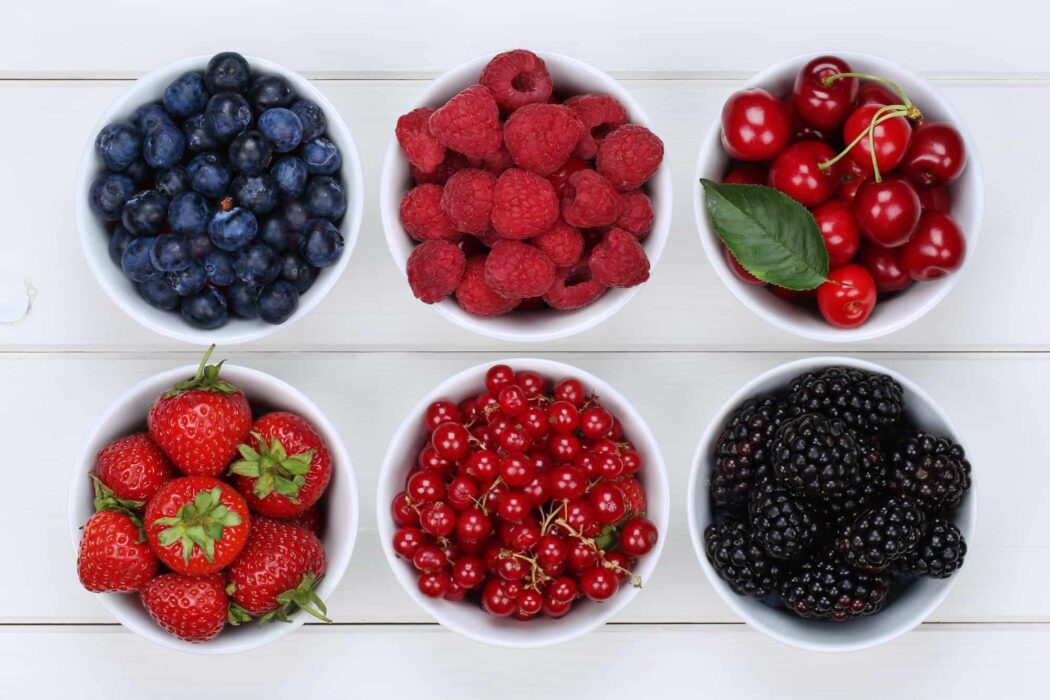
What fruits are keto? What berries are allowed on the keto diet? How many carbohydrates are in berries? What is the best fruit for keto? What are the benefits of fruits and berries for your keto diet? Here is an in-depth guide to keto-friendly fruits. Keep reading to find out more!
The Best Fruits for the Keto Diet
Fruits are generally very high in carbohydrates, which are represented by fructose and glucose, but some fruits will suit your low-carb diet. So what fruits are keto?
Avocado
Many of you may be surprised to learn that avocado is a fruit. Yes, albeit special, but it is exactly so. What’s more, avocado is your best friend on the keto diet. It has a delicate pulp, which is full of many useful substances. Avocado is keto. Depending on the variety, 100 grams of avocado contain about:
- 160-180 calories
- 2 grams of protein
- 13-16 grams of fat
- 7-8 grams of carbohydrates
- 5-6 grams of fiber
- 2 grams of net carbs.
And while other keto fruits may be low in carbs, none of them are high in healthy fats. It makes avocados an ideal meal during a low-carb diet. What are the health benefits of avocado while on a keto diet?
Avocado contains a large number of various elements and vitamins (group B, E, A, C, K, folic acid), minerals (calcium, potassium, phosphorus, iron, sodium, iodine, copper, magnesium, and many others). Despite the high-calorie content, avocados can help you lose weight thanks to their easily digestible monounsaturated fats. The health benefits of avocado are truly endless. It contains oleic acid, which can reduce blood cholesterol levels and prevent heart and vascular diseases. In addition, it contains phytonutrients that help destroy malignant cells without any harm to healthy ones.
The benefits of avocados come from trace elements that activate the regeneration of red blood cells and prevent anemia. Due to the potassium content, they are beneficial for maintaining the cardiovascular system. Since this fruit contains fiber, it is useful to consume it during problems in the functioning of the digestive system. Avocado helps to smooth the skin, fights wrinkles, and keeps it intact. In addition, the fruits help to reduce inflammation, such as psoriasis, acne, etc.
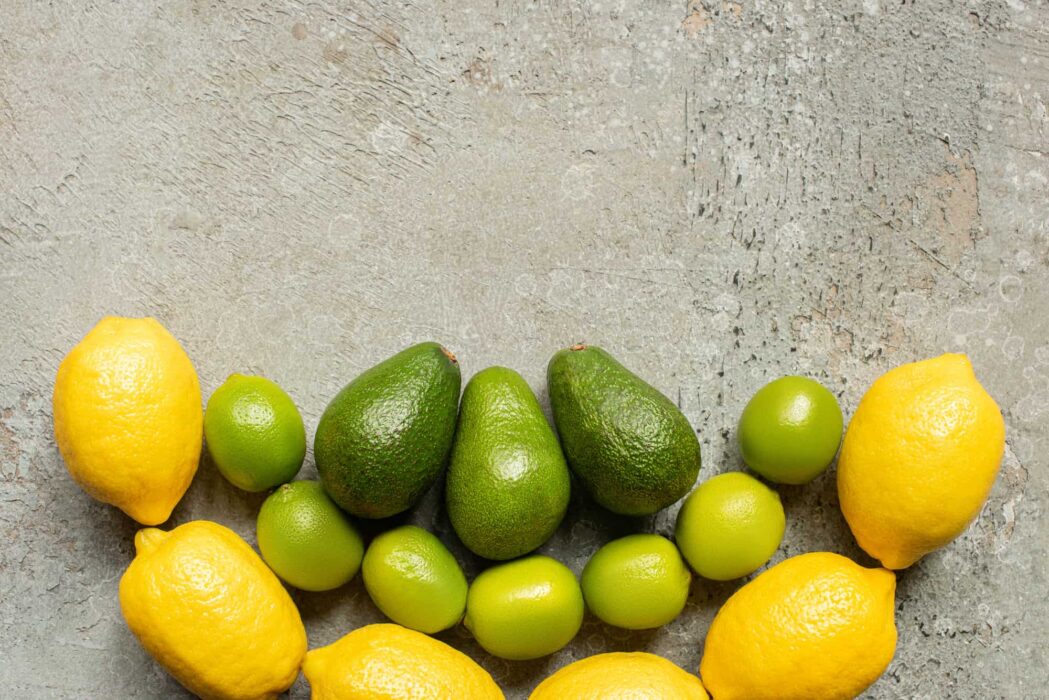
Lemon
Lemon is a great fruit for the keto diet. And while you are unlikely to eat the whole lemon, it makes a great addition to keto desserts, meat, and fish. You can even make keto lemonade by squeezing the juice of half a lemon into a glass of soda and adding a few drops of low-carb syrup. Lemon is keto. 100 grams of lemon contain:
- 34 calories
- 2 grams of protein
- 1 gram of fat
- 3 grams of carbohydrates
- 2 grams of fiber
- 1 gram of net carbs.
They say that no herbal remedy can compete with lemon in its antiseptic and bactericidal properties. And this is really true. Lemons are rich in alkaline elements. They contain organic acids, nitrogenous and mineral substances (including potassium and copper salts), vitamins A, B, B2, P, C, and phytoncides. Lemon peels and leaves are rich in essential oils.
Lemons are used to treat and prevent hypovitaminosis, vitamin deficiency, and diseases of the gastrointestinal tract. They help with violation of mineral metabolism, atherosclerosis, tonsillitis, and hypertension. Also, lemon is a source of citrine, thanks to which it improves metabolism and the cardiovascular system and has a beneficial effect on the recovery of the body after illnesses.
Lime
Lime is the second citrus fruit available for the keto diet. You can also use it both in desserts and to add flavor to main dishes. Lime is keto and is great for a low-carb diet. 100 grams of lime contain:
- 30 calories
- 7 grams of protein
- 2 grams of fat
- 7 grams of carbohydrates
- 4 grams of fiber
- 3 grams of net carbs.
Lime contains a lot of vitamins C and A, as well as many B vitamins. It also has calcium, potassium, phosphorus, and iron. The high content of ascorbic acid and potassium helps lime to strengthen blood vessels. Thanks to calcium and phosphorus, regular consumption of this fruit will help protect teeth from tooth decay and various harmful deposits and reduce the risk of gum disease.
Pectin, also found in lime, is beneficial for removing harmful substances from the body. Essential oils normalize the digestive process and improve appetite. Lime is recommended as an excellent remedy for the prevention of diseases in the cardiovascular system. Among other things, lime has a calming effect on the nervous system and improves mood. All parts of lime have antiseptic, anti-viral, and anti-rheumatic properties. Lime effectively relieves pain in the throat, stomach, and intestines, and soothes and neutralizes the effects of stress.
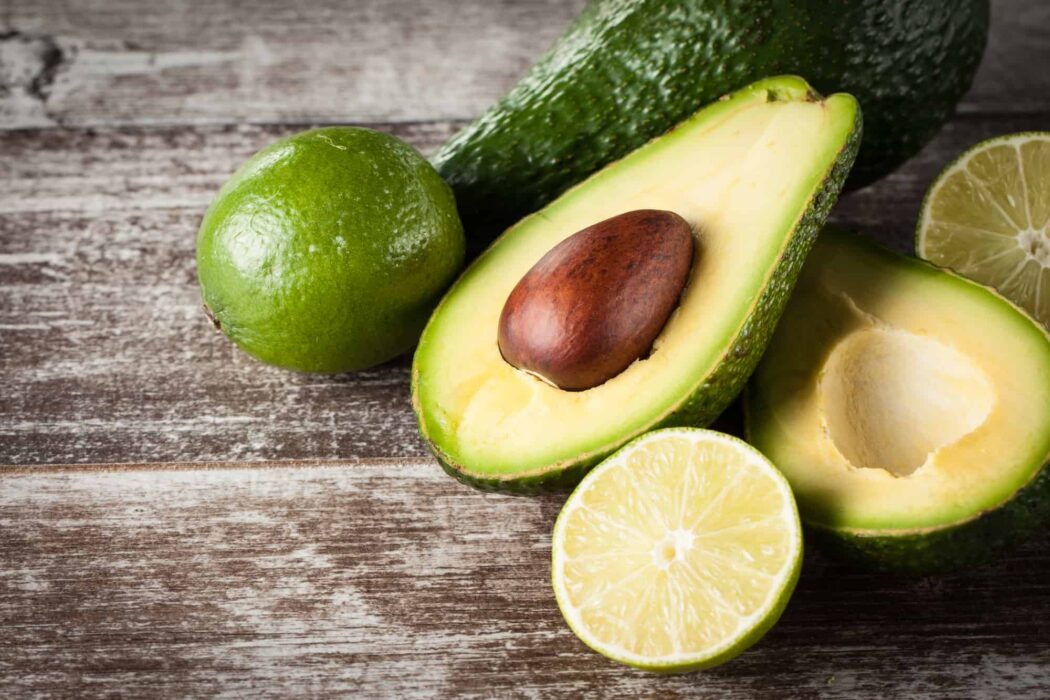
Watermelon
Watermelon is a sweet and aromatic treat that doesn’t seem like a low carb to us. However, watermelon is keto, and you can consume small amounts to pamper yourself during your diet. 100 grams of watermelon contain:
- 27 calories
- 7 grams of protein
- 1 gram of fat
- 6 grams of carbohydrates
- 1 gram of fiber
- 5 grams of net carbs.
Watermelon is a valuable source of vitamins, micro and macroelements. It contains vitamin A, B vitamins (B1, B2, B6, B9, and PP), C, E, magnesium, potassium, calcium, phosphorus, iron, and sodium. The antioxidants abundant in watermelon include lycopene, niacin, and thiamine, as well as carotene, riboflavin, and ascorbic acid.
This composition of watermelon has a lot of positive effects on the body. The high water content allows the use of watermelon as a diuretic and choleretic agent. Watermelon juice can cleanse the liver and kidneys from toxins. The dietary fiber contained in watermelon is tender and soft, and it also helps to lower cholesterol.
Aronia Berry Benefits for Healthy Diet
Folic acid positively affects the formation of DNA and RNA, cell division, protein metabolism, affects the beauty and health of the skin, hair, and the functioning of digestion. The high content of antioxidants in a watermelon prevents aging processes, protects the body from age-related disorders, fights free radicals, and helps to resist the development of cancer. Magnesium ensures the normal absorption of other nutrients (calcium, sodium, potassium), which is beneficial for the internal organs, in particular for the cardiovascular system.
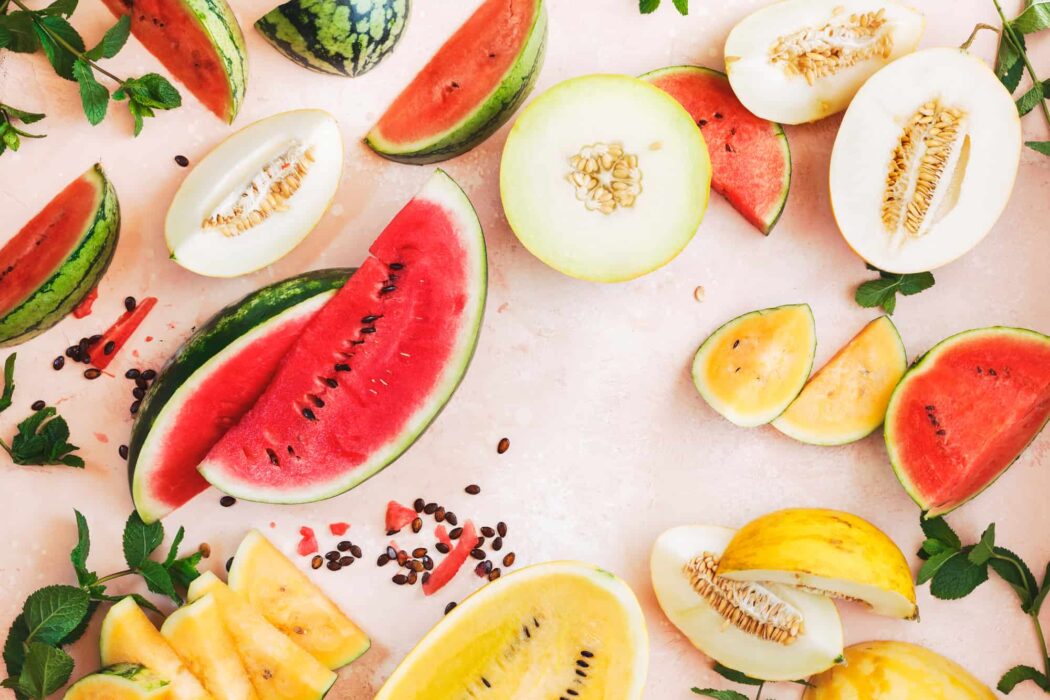
Cantaloupe
Cantaloupe may seem like a high-carb fruit due to its sweetness and delicate honey flavor. However, cantaloupe is keto in small amounts, so it can help you diversify your low-carb diet. 100 grams of cantaloupe contain:
- 34 calories
- 8 grams of protein
- 2 grams of fat
- 7 grams of carbohydrates
- 1 gram of fiber
- 6 grams of net carbs.
The beneficial properties of cantaloupe are possible only due to its diverse vitamin and mineral composition. So, cantaloupe contains a large amount of ascorbic acid, which positively affects the state of immunity and helps the body fight various infections and viruses. The fruits also contain inosine, which resists hair loss and prevents fat and cholesterol from accumulating in the body.
This type of melon is the leader in carotene content, which is necessary for the human body. There is folic acid, which is necessary for pregnant women. The pulp contains silicon, which has a positive effect on the condition of hair and skin.
Cantaloupe includes fiber, which has a positive effect on the functioning of the digestive system and helps prevent constipation. In addition, it absorbs toxins and waste products and then removes them from the body.
Peach
We all probably associate peaches with summer and a pleasant mood. Good news! Peach is keto in moderation, so sometimes, you can indulge yourself in this aromatic fruit. 100 grams of a peach contain:
- 45 calories
- 9 grams of protein
- 1 gram of fat
- 9 grams of carbohydrates
- 3 grams of fiber
- 6 grams of net carbs.
Iron, which is essential for oxygen supply to cells and tissues, is not produced in the human body, and we get it from food. Peaches are an ideal dietary supplement for iron deficiency anemia. After all, they contain five times more of this trace element than apples.
The content of vitamin C is also high, which helps protect the immune system from the effects of viruses. B vitamins, vitamin K, vitamin A are part of peaches and make them useful for health. And provitamin carotene, which is also present in large quantities in this fruit, affects the regeneration processes and accelerates metabolism.
Peaches satisfy hunger well and aid digestion. Due to their high potassium and magnesium content, peaches are beneficial for anemia, heart disease, and stress. These fruits are recommended when recovering from a serious illness. Peaches help keep skin youthful by preventing the appearance of wrinkles and age spots.
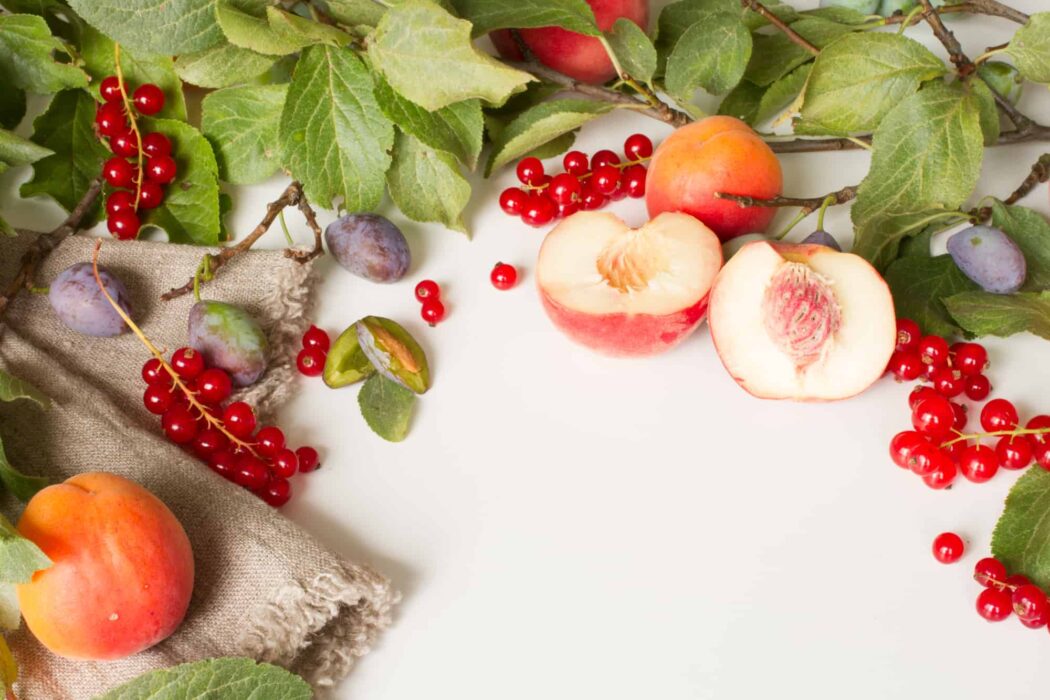
Plum
Plum is another sweet fruit that can be consumed on a keto diet. It contains fewer carbohydrates than other sweet fruits, but they are still present in plums. You need to carefully calculate your daily carbohydrate intake if you are going to pamper yourself with a plum. But, in general, I can conclude that plum is a keto-friendly fruit because 100 grams of it, depending on the variety, contain:
- 39-46 calories
- 8 grams of protein
- 3 grams of fat
- 7-9 grams of carbohydrates
- 1-2 grams of fiber
- 6-7 grams of net carbs.
Plums are an excellent colon cleanser, choleretic and diuretic. They contain a large amount of vitamins A, C, B, PP, and trace elements (potassium, magnesium, iron). The dark color of the plum is given by anthocyanins – useful substances that have an antioxidant effect. That is, they protect the body from cancer and rapid aging. Especially a lot of fiber is found in the peel and pectins – in the pulp of the fruit. Plums are excellent for preventing intestinal oncology, inflammatory processes, and hemorrhoids. They have many substances with an anti-inflammatory effect.
Due to a lack of iron, anemia may appear – a condition of the body in which hemoglobin in the blood is reduced. Symptoms of mild anemia include fatigue, irritability, shortness of breath, and decreased performance. Plum stands out among other fruits and berries with a high iron content – 2.1 mg per 100 grams. Therefore, it will help prevent iron deficiency in the human body and thereby relieve anemia.
Orange
Oranges are keto in small amounts. I don’t actually recommend eating oranges as a whole fruit on keto. Still, you can use them to enhance the flavor of other dishes. Add zest to keto pastry, use orange juice as a marinade for meat, or add a couple of orange slices to keto porridge. 100 grams of orange contain:
- 36 calories
- 9 grams of protein
- 2 grams of fat
- 8 grams of carbohydrates
- 1 gram of fiber
- 7 grams of net carbs.
Orange is an extremely healthy fruit with a rich vitamin and mineral composition. It contains folic acid, beta-carotene, vitamins of group B, A, B1, B2, B5, B6, C, H, and PP, as well as minerals necessary for the body: potassium, iron, zinc, calcium, magnesium, molybdenum, phosphorus and sodium. Orange, especially in the white part of the peel, contains pectins, which help to increase intestinal motility.
Oranges are excellent for preventing vitamin deficiency, strengthening the immune system. They lower blood cholesterol levels and have a beneficial effect on the activity of the cardiovascular system. Orange has an anti-inflammatory and antimicrobial effect. It is recommended for nervous system diseases, gout, and recovery from viral diseases and fractures, as it promotes bone tissue regeneration.
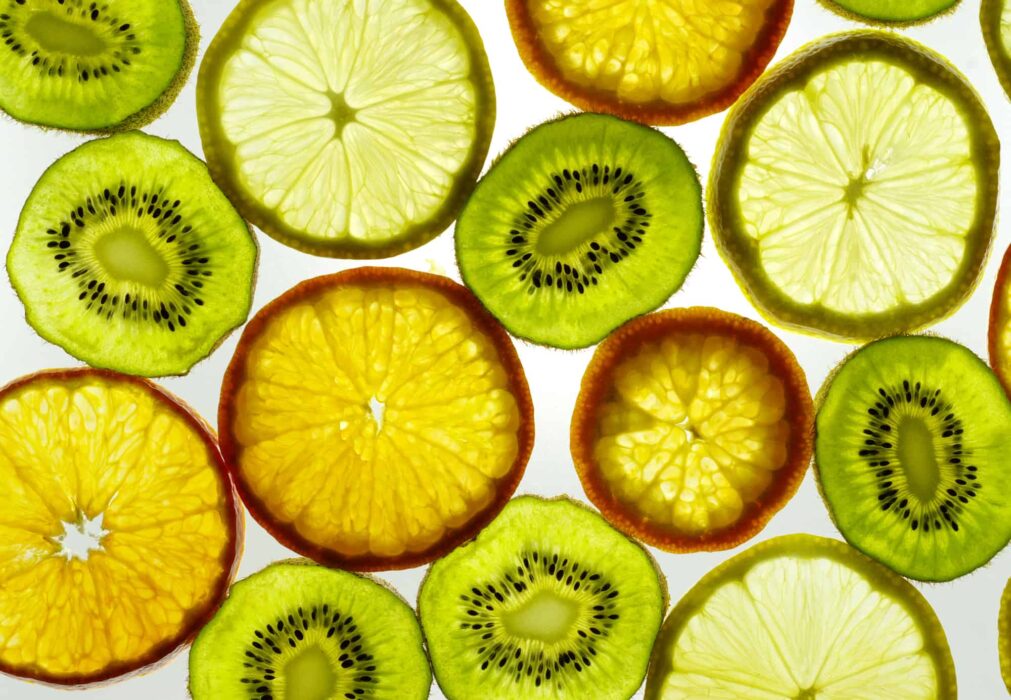
Kiwi
Kiwi is also more of a keto treat than a regular feature on your menu. Suppose your daily carbohydrate intake is 20 grams. In that case, you can occasionally afford half a kiwi for a sweet treat and health benefits. So, kiwi is keto, and its 100 grams contain:
- 47 calories
- 8 grams of protein
- 4 grams of fat
- 8 grams of carbohydrates
- 3 grams of fiber
- 5 grams of net carbs.
Kiwi contains many vitamins – A, B1, B2, B6, B9, C, and PP, which makes it useful for the whole body. One berry provides you with a daily dose of vitamin C. The fruits are rich in phylloquinone, which is necessary for protein synthesis and improving blood clotting.
Kiwi is also rich in iron, zinc, potassium, calcium, magnesium, sodium, and phosphorus. It means that kiwi strengthens the immune system, treats colds, increases the body’s resistance to stress, relieves heaviness in the stomach and shortness of breath, and promotes weight loss.
Star Fruit
These amazing tropical stars can add variety to your low-carb diet because star fruit is keto. Of course, due to the carbohydrate content, you should limit the amount. Still, you can safely eat a couple of fruits per week if you have not exceeded your daily 20 grams of carbohydrates. I love to cut the fruit into thin slices and bake it in the oven for lovely keto chips. 100 grams of star fruit contain:
- 31 calories
- 1 gram of protein
- 3 grams of fat
- 7 grams of carbohydrates
- 3 grams of fiber
- 4 grams of net carbs.
Carambola lowers blood pressure, quenches thirst, and has a mild laxative effect. Due to the high content of vitamin C, the star fruit stimulates the immune system. The presence of magnesium in its composition removes excess fluid from the tissues of the body. The composition of the fruit includes a huge amount of vitamins and nutrients. For example, Vitamin B1, also called thiamine, is essential for the normal functioning of the nervous system.
High Thermic Effect: Foods to Eat and to Avoid
In addition, it has a positive effect on the functioning of the digestive system. The carambola also contains vitamin B5, which takes part in regulating the metabolism of fats and carbohydrates. In addition, it synthesizes acids, cholesterol, and hemoglobin necessary for the body. Considering this, I can say that star fruit is an excellent prevention of arthritis, heart disease, colitis, and allergies.

The Best Berries for the Keto Diets
Berries contain fewer carbohydrates than fruits and are therefore great for a keto diet. But some of them are slightly higher in fructose, so here’s a list of keto-friendly berries and their health benefits.
Raspberries
Raspberries are a great low-carb berry. It’s safe to say that raspberries are keto, and you can safely add them to your daily diet by combining them with other low-carb berries and fruits. How many carbs in raspberries are there? 100 grams of raspberries contain:
- 53 calories
- 2 grams of protein
- 7 grams of fat
- 12 grams of carbohydrates
- 8 grams of fiber
- 4 grams of net carbs.
Raspberry contains little sugar, a small amount of essential oil, and fatty oil – more than 20% (in seeds). There are also organic acids – salicylic, tartaric, malic, citric, pectins, proteins, tannins, vitamins A, C, group B, minerals, anthocyanins, and catechins – substances with antioxidant properties. Berries contain fructose, pectin, and iron. They stimulate blood flow, support the heart, reduce inflammation, and fight infection.
The beneficial substances of raspberries regulate blood composition and strengthen blood vessels. The low-calorie content of raspberries is perfectly combined with a rich set of vitamins and minerals. Therefore, these low-carb berries help to speed up metabolism, improve blood circulation, eliminate toxins, and have a tonic and refresher effect.
Thanks to the antioxidants it contains, raspberries promote cell regeneration, have a beneficial effect on the skin, and hair, and regulate the sebaceous glands. Regular consumption of raspberries helps accelerate circulation and thin the blood and dilate blood vessels, which is an excellent way to prevent cardiovascular diseases and blood clots.
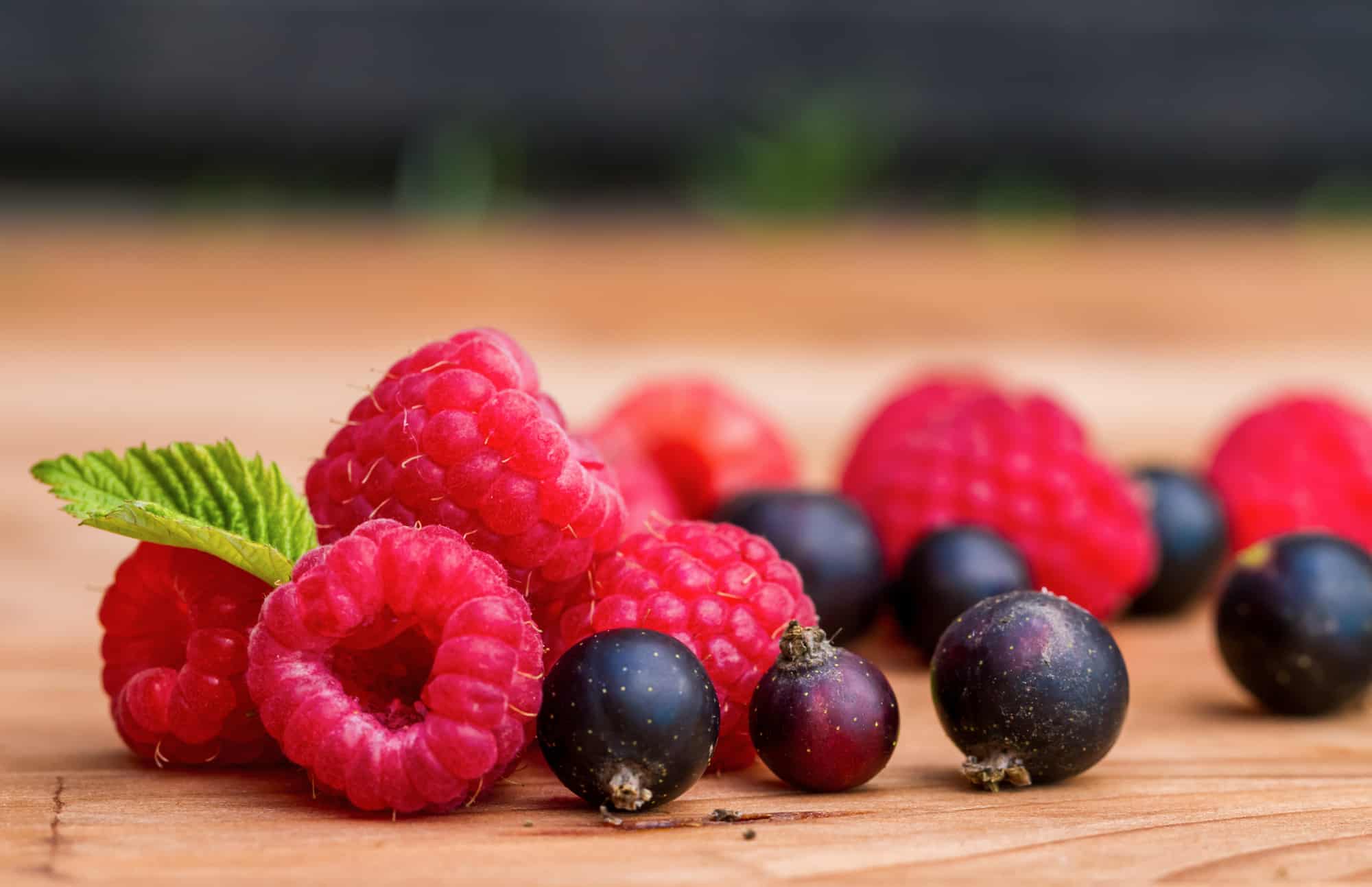
Cranberries
Cranberries are slightly sour and bitter berry, low in carbohydrates, and great for a low-carb diet. You are unlikely to eat cranberries raw due to their specific flavor. Still, they will perfectly complement any keto pie, cookie, or keto porridge. So, cranberries are keto, and 100 grams of this berry contain:
- 25 calories
- 2 grams of protein
- 1 gram of fat
- 7 grams of carbohydrates
- 4 grams of fiber
- 3 grams of net carbs.
Cranberries contain fat-soluble vitamins A, beta-carotene, E, and K and water-soluble vitamins C, B1, B2, B3 (PP), B4, B5, B6, and B9. The berry contains calcium, iron, magnesium, phosphorus, potassium, sodium, zinc, copper, manganese, and selenium.
Cranberries contain a large number of antioxidants that reduce chronic inflammation and prevent the development of malignant neoplasms. Eating cranberries are effective against infectious diseases and inflammations. This berry helps to fight various infections. It serves as an excellent antipyretic agent and removes toxins that have accumulated during illness. Being a natural antibiotic, this wonderful berry will speed up the healing process for tonsillitis, colds, and viral infections. Its beneficial properties are invaluable for pyelonephritis, and cystitis.
Strawberries
Are strawberries keto? Yes! Strawberries are keto berries, one of the most popular berries on low-carb diets. They contain few carbohydrates and many nutrients, so you can eat them regularly. 100 grams of strawberries contain:
- 33 calories
- 7 grams of protein
- 3 grams of fat
- 8 grams of carbohydrates
- 3 grams of fiber
- 5 grams of net carbs.
Strawberries are among the berries that contain the highest amount of valuable nutrients. It is an excellent source of fiber, low in calories, and relatively low in sugar. Strawberries contain anti-aging flavonoids, antioxidants – anthocyanins and catechins, which reduce the risk of developing chronic diseases, including cancer, and cardiovascular diseases. It has positive effects on eye health, neurological health, and skin.
Strawberries are high in fiber, which is essential for gut health on keto. Fresh berries are especially useful – after heat treatment or freezing, strawberries are deprived of many vitamins and minerals.
Strawberries are high in Vitamin C. Its benefits for immunity, skin, hair, and nails are undeniable. They are also renowned for their antioxidant properties as they contain many different elements that neutralize free radicals. In addition, these berries have a destructive effect on cells, provoking inflammation, the growth of cancerous tumors, and various pathologies. Ellagic acid, flavonoids, in particular anthocyanins, inhibit the growth of bacteria and prevent inflammation.

Blueberries
Are blueberries keto? Blueberries are the highest in carbohydrates of all the berries allowed on the keto diet, so you shouldn’t eat them often. And while blueberries are keto, consume them only in small quantities. Eat them occasionally, add a handful of berries to your keto dessert, and keep an eye on your total net carbs. How many carbs do blueberries have? 100 grams of blueberries contain:
- 57 calories
- 7 grams of protein
- 3 grams of fat
- 13 grams of carbohydrates
- 4 grams of fiber
- 9 grams of net carbs.
Blueberries contain vitamins B1, B2, PP, C, A, P, calcium, phosphorus, iron, phenolic compounds, sugars, organic acids, fiber, tannins, coloring, and pectin substances. They increase concentration and have an anti-inflammatory, anti-sclerotic, antipyretic, capillary-strengthening effect. Blueberry improves appetite, strengthens the walls of blood vessels, and is considered an excellent anti-inflammatory food, choleretic, and diuretic. Also, blueberries prevent the manifestation of sclerosis, protect the body from radiation, lower blood sugar and help with stomach and heart diseases.
Blueberry leaves and berries can lower blood sugar levels. Mashed berries and blueberry juice are useful for enterocolitis, cystitis, and gastritis with low acidity. Blueberries are also beneficial for diabetes, anemia, and heart disease. The sour blueberry drink is useful for colds, fever, and inflammation of the kidneys and bladder.

Conclusion
As you can see, while on a keto diet, you don’t have to completely cut out fruits and berries, especially if you follow the vegetarian keto diet. You can add them to keto yogurt, low-carb desserts, or just occasionally eat a small serving of fresh fruits and berries. However, I want to draw your attention to the fact that you will have to carefully control the serving and consider all the carbohydrates you eat per day. Therefore, fruits and berries should not be a regular meal but rather a pleasant keto treat.
Keto-Friendly Nuts: What to Eat and What to Avoid
Enjoy a varied keto diet with this list of low-carb fruits and berries. And make your keto diet enjoyable and healthy!